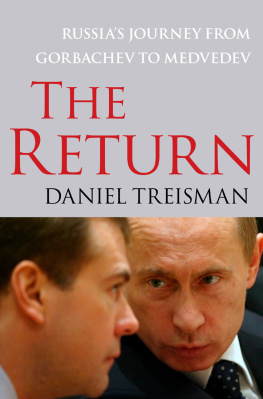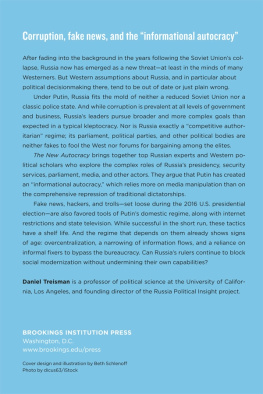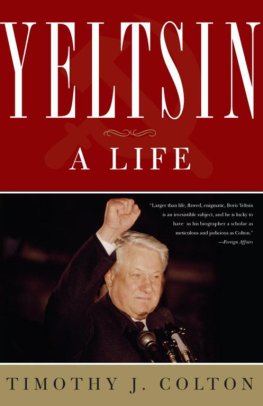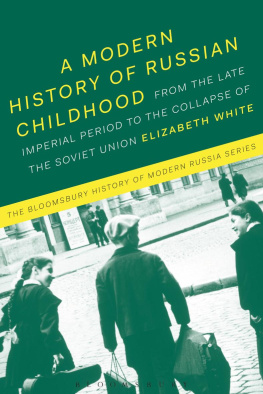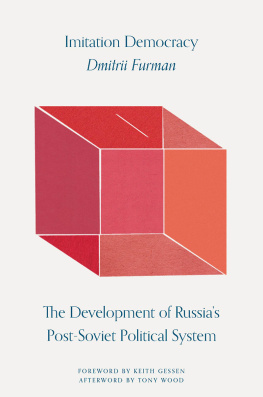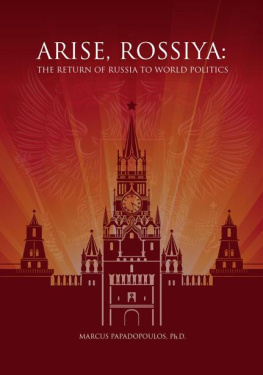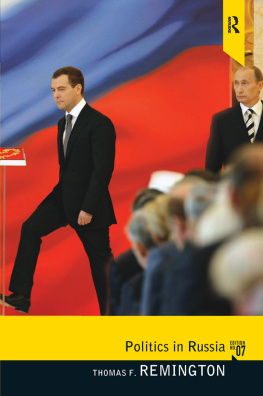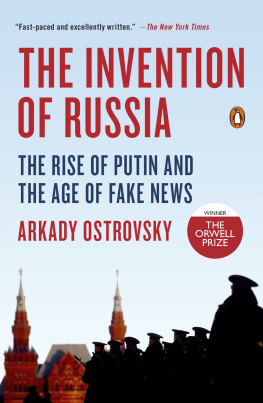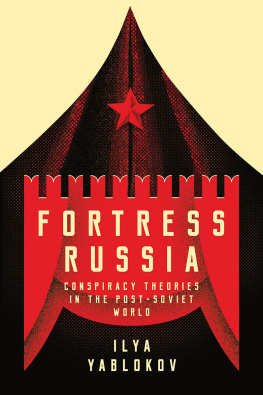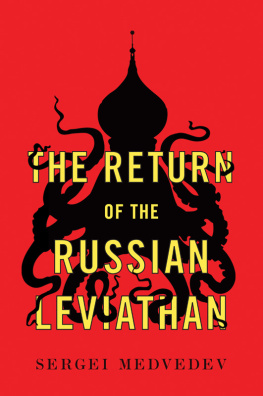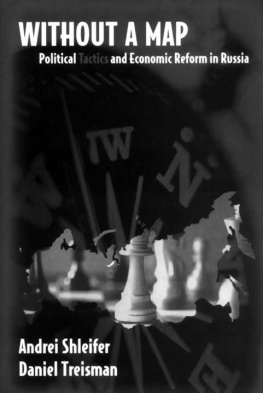Praise for
THE RETURN
The comprehensiveness and clarity of The Return make it a valuable resource for anyone trying to make sense of the puzzle that is Russia.
The Dallas Morning News
Treisman explores the path of postcommunist Russia in this engrossing study.
Publishers Weekly
Possessing both deft storytelling abilities and deep scholarly knowledge, Treisman provides a truly masterful exposition of the tumultuous past two decades in Russian history, politics, and society. Anyone interested in Russia and its leaders should read this book.
James Goldgeier, George Washington University
Daniel Treisman treats us to an elegant and learned history that demystifies Russias transformation from a communist state to a normal country. This is the best and most readable account of Russias rebirth.
Anders slund, Senior Fellow, Peterson Institute for International Economics
This excellent book provides both an elegant and comprehensive account of Russias turbulent history over the last quarter century and penetrating and sometimes surprising analyses of the main political and economic issues that that history raises.
Michael Mandelbaum, author of The Frugal Superpower: Americas Global Leadership in a Cash-Strapped Era
Daniel Treisman has written a book about Russia today that is calm, sane, judicious, very well informed, and written in the kind of prose that makes you want to read on. It is a welcome and necessary antidote to much fashionable Western writing that portrays Russia as a kleptocracy ruled by a secret policeman intent on victory in a new Cold War.... Russia has certainly returned. Whether we like it or not we are likely, if we want to achieve our own objectives, to find ourselves having to treat the Russians with the respect they believe they deserve and can increasingly command.
Rodric Braithwaite, former UK ambassador to the Soviet Union and Russia and author of Across the Moscow River: The World Turned Upside Down and Moscow 1941: A City and Its People at War


FREE PRESS
A Division of Simon & Schuster, Inc.
1230 Avenue of the Americas
New York, NY 10020
www.SimonandSchuster.com
Copyright 2011 by Daniel Treisman
All rights reserved, including the right to reproduce this book or portions thereof in any form whatsoever. For information address Free Press Subsidiary Rights Department, 1230 Avenue of the Americas, New York, NY 10020.
First Free Press trade paperback edition January 2012
FREE PRESS and colophon are trademarks of Simon & Schuster, Inc.
The Simon & Schuster Speakers Bureau can bring authors to your live event. For more information or to book an event, contact the Simon & Schuster Speakers Bureau at 1-866-248-3049 or visit our website at www.simonspeakers.com.
Designed by Paul Dippolito
Library of Congress Cataloging-in-Publication Data
Treisman, Daniel.
The return : Russias journey from Gorbachev to Medvedev / by Daniel Treisman.
p. cm.
1. Russia (Federation)Politics and government1991 I. Title.
JN6695.T74 2010
947.086dc22
2010011520
ISBN 978-1-4165-6071-5
ISBN 978-1-4165-6072-2 (pbk)
ISBN 978-1-4516-0574-5 (ebook)
To Susi, Alex, and Lara
CONTENTS
PREFACE
R ussia has returned. Not to the West, of which it was never truly a part. But to the world. Twenty years after the iron curtain was drawn back, Russians vacation in Turkey and on the Cte dAzur, place international calls on Finnish cell phones, and debate the hairstyles of Hollywood celebrities on internet forums. Their leaders no longer dream of infiltrating Marxist revolutionaries into the capitalist democracies. They are too busy planning G20 summits or conducting war games with China. Russian businessmen, now regulars at Davos, own American steel mills, African gold mines, French chateaus, and British sports teams. In London, Rome, and New York, it is no longer rare to overhear conversation in the language of Pushkin.
This is not the first time Russia has come out of isolation. In the twelfth century, the princes of Kievan Rus were integrated into the West through trade and marriage with the royal families of Europe. Then the Mongols penetrated the forests. Conquered and colonized, Russians lost touch with the outside world for more than two centuries. Reintegration was slow. It took the Europeanizing demon of Peter the Great to shave the beards off his countrys upper classes, dress them in German clothes, and turn them into cosmopolitans again. If Peters revolution was Russias first return to the world, the journey back after communism has been its second.
This book is about that journey. It has been a complicated one, part obstacle course, part voyage of discovery. The transition started with an economic crisis that lasted a decade. In politics, two steps forward toward democracy were often followed by one, two, or three steps back. Early hopes for a partnership with the United States and Europe gave way in time to mutual recrimination. But Russia is here to stay. With one elbow on Germany, the other on China, as the philosopher Chaadaev put it, the country is itself of global proportions. Its leaders have no plans to retreat into a third period of isolation. Most of the international problems that concern the West will be hard to solve without Russias cooperationfrom climate change and Islamic terrorism to nuclear proliferation and energy security. It is important to understand the Russia that has returned.
I first visited the country in 1988 and have gone back almost every year since then, first as a doctoral student, later as a professor. To make sense of Russias recent history, I draw on the memoirs of those who shaped it, the analyses of other scholars, statistical data and public opinion surveys, as well as my own observation, interviews, and research. Of course, much is still not known and much is debated. I have tried to indicate when questions have no generally accepted answer and to justify the interpretive paths I have taken.
Along the way, I have done my best to avoid two familiar styles of writing about the country. Common among both Western and Russian authors, these seem to me to obscure more than they reveal. The first approach is to focus on the countrys dark side, to present Russia as a land of deformity. This genre has a long history. From sixteenth century European travelogues, one learns that Russian peasants at that time were , which existed only to teach the world some great lesson. Much journalism and historical writing shares this preoccupation with the countrys dismal side.
The second approach is to turn mystical when Russia is mentioned, to exult in paradoxes and wallow in the exotic. Russia, it is said, is unique and unknowable. It hides its secrets from social scientists and statisticians. Russia, writes the novelist Tatyana Tolstaya, possesses there is a sort of immensity, a vagueness, a predilection for the infinite, such as is suggested by the great plain of Russia. In short, an easy place to get lost.
As a literary trope, such word spinninga kind of orientalism practiced by the orientalsis harmless enough. As a business proposition, it has a certain logic. Todays Russians surely have a right to market their onion domes and spiritual intensity, just as a century ago Diaghilev, with his Ballets Russes , sold the
THE RETURN
CHAPTER 1
The Captain
M ikhail Gorbachev steered the for six years and nine months. An idealistic socialist, he set out to revitalize the communist order he had inherited, to inject open discussion, creativity, and common sense into an ossified Leninist party. He ended forty years of nuclear confrontation with the West and introduced the beginnings of democracy and economic freedom. Yet, to his dismay and despite his energetic maneuvering, the course he charted led into a hurricane. By the time he left office, the economy was in ruins, the ruling communist parties in his country and its European satellites had been swept from office, and the Soviet multinational state had fractured into fifteen pieces.
Next page
